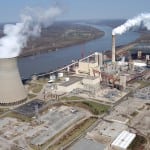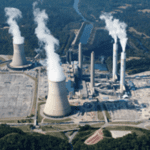Dynegy Inc. must disclose timely and relevant information to investors about the financial risks that climate change may pose under an agreement the national energy company signed with New York’s attorney general on Thursday.
Dynegy is the second of five companies to agree to make climate change disclosures. Xcel Energy was the first, signing a similar accord with Attorney General Andrew Cuomo on Aug. 27.
As reported by POWERnews, Cuomo had called that agreement a “landmark settlement” that would set “an industry wide precedent” and “force companies to disclose the true financial risks that climate change poses to their investors.”
On Thursday, Cuomo announced his office’s agreement (PDF) with Dynegy alongside former vice president and climate change proponent Al Gore.
“Today we raise the bar in the industry and ensure transparency and disclosure in the marketplace. Investors have the right to know all the material financial risks faced by coal-fired power plants associated with global warming and I hope and expect that other companies will follow the lead of Dynegy and Xcel,” he said.
Under the agreement, Dynegy will provide disclosure of material risks associated with climate change in its Form 10-K filings—the annual summary report to inform investors on a company’s performance—required by the Securities and Exchange Commission (SEC).
These required disclosures include analyses of material financial risks from climate change related to present and probable future climate change regulation and legislation, climate change–related litigation, and physical impacts of climate change.
Dynegy also agreed to disclose its current carbon emissions; its projected emission increases from planned coal-fired power plants; company strategies for reducing, offsetting, limiting, or otherwise managing emissions; and corporate actions related to climate change—including if environmental performance is incorporated into officer compensation.
According to a statement from Cuomo’s office, new or likely regulatory efforts to control carbon emissions, such as New York’s newly adopted regional carbon regulations for fossil-fueled power plants, will create “substantial financial risks” for energy companies.
“These risks are exacerbated for power companies that are building new coal-burning power plants or other large new sources of global warming pollution emissions. Knowledge of material risks is important for investors to consider,” it said.
Cuomo had subpoenaed executives from five major utilities—Xcel Energy, AES Corp., Dominion, Dynegy, and Peabody Energy—on Sept. 14, 2007, to determine whether disclosures to investors adequately described the companies’ financial risks related to their greenhouse gas emissions.
In a statement announcing its agreement with the attorney general—the first of its kind in the U.S.—Xcel said that Cuomo was particularly interested in its public disclosures of the financial condition and plans to construct a new 750-MW coal-fired unit at the Comanche station in Pueblo, Colo.
Dynegy has been branded the “king” of coal-fired power plant owners by the National Environmental Trust. About 24% of the Houston-based company’s production capacity is coal-fired.
Through its subsidiaries, Dynegy produces and sells electric energy, capacity, and ancillary services in many U.S. markets. The company’s power generation portfolio (PDF) consists of more than 18,000 MW of baseload, intermediate, and peaking power plants fueled by a mix of natural gas, coal, and fuel oil.
In addition to its operating assets, Dynegy owns a 50% interest in a joint development venture with LS Power. The two companies have planned 6,400 MW of potential new projects, including coal and gas initiatives.
The company is currently fighting a lawsuit in federal court filed in August by Sierra Club, an environmental group that wants to halt construction of one of these projects, the 287-MW Sandy Creek plant in Riesel, Texas. The group has demanded that Dynegy and LS Power return to the Texas environmental agency for a new permit that would require tougher emission standards.
The attorney general’s statement Thursday noted that Dynegy had cooperated fully with his office’s inquiry.
Dynegy did not publish a public statement about the agreement, though CEO Bruce Williamson told the Houston Chronicle that electricity buyers, not producers, dictate the types of units being built, choosing coal because it provides for lower costs.
Cuomo’s inquiry into AES Corp., Dominion, and Peabody Energy is ongoing. The attorney general and others also petitioned the SEC last year to improve corporate disclosure of climate-related risks in securities filings.
Sources: Office of the New York Attorney General, Dynegy Inc., Xcel Energy, Reuters, Houston Chronicle








